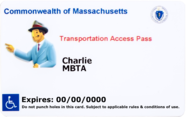November 2022 Advocacy Update
Transportation
MBTA Launches Online Applications for TAP Customers
MBTA customers may now apply online for a new, renewed, or replacement Transportation Access Pass (TAP) CharlieCard. Persons with disabilities are eligible for reduced TAP fares. Riders will still be able to apply in-person at the CharlieCard Store (and can make online reservations to visit the CharlieCard Store) and may also visit the MBTA Mobility Center for online application support. Read all about it!
WalkBoston wants to help you report sidewalk problems
WalkBoston – a nonprofit that actually works with communities statewide to make walking safer and easier for pedestrians of all abilities – has compiled information on how to report street or sidewalk problems for all 351 municipalities in Massachusetts. Check out their new “How to Report a Problem” interactive map to get contact information for local and regional authorities in charge of street and sidewalk issues. Learn more in the WalkBoston blog and National Center for Mobility Management blog, and consider attending a meeting of the WalkMassachusetts Network to make connections and get support.
Accessible charging for electric vehicles
Is your community, apartment/condo building, or workplace planning to build new electric vehicle charging infrastructure? If not now, they will be soon, since Massachusetts has a strong EV mandate and offers significant incentives. Fortunately, the U.S. Access Board has developed Design Recommendations for Accessible Electric Vehicle Charging Stations to help avoid making mistakes that might pose difficulty for wheelchair users accessing and using chargers. Put this reader-friendly resource into the hands of those in charge (forgive the pun).
From United Spinal National
Seat Elevation and Standing Devices Features in Power Wheelchairs
Thank you to so many of you who responded to the federal action alerts over the last few weeks to request that the Centers for Medicare and Medicaid Services (CMS) provide insurance coverage for both seat elevation and standing devices for power wheelchairs. Click here for more information.
With your help, we were able to get over 100 Congressional offices sign onto Congressional letters (Dear Colleague letters) to the CMS Administrator, Chiquita Brooks La-Sure.
View House Dear Colleague with 81 Representative Signatures – led by House Bipartisan Disabilities Caucus Co-chairs: Representatives Langevin (D-RI), Fitzpatrick (R-PA) and Dingell (D-MI) as well as Representative Rose (R-TN).
View Senate Dear Colleague with 22 Senate Signatures – led by Senators Casey (D-PA), Duckworth (D-IL) and Blackburn (R-TN).
Opportunity to Share Your Comments to Help the Federal Government Work Better for You
U.S. Access Board Seeks Public Comment on Accessibility Guidelines for Self-Service Transaction Machines (Kiosks)
The Americans with Disabilities Act and the American Bar Association Accessibility Standards require ATMs and fare vending machines to be accessible to people who have mobility disabilities, limited dexterity, or are of short stature by addressing clear floor space, reach range, operable parts, privacy, speech output, braille, and display screens.
Touchscreen kiosks and other types of self-service transaction machines (SSTMs) are a common feature in places of public accommodation, government offices, and other buildings and facilities, allowing users to independently conduct a range of transactions and functions. The U.S. Access Board has issued an advance notice of proposed rulemaking (ANPRM) on supplemental accessibility guidelines for different types of SSTMs, including electronic self-service kiosks, for persons with disabilities.
Public comments for the rule are due by November 21, 2022. Individuals may submit their own comments. For more information click here.
The Centers for Medicare and Medicaid Services (CMS) – Health Equity
CMS has a request for information open on health equity open until November 4. Here is the link for more information and for individuals to submit their own comments
Share your Wheelchair Denied Story
Have you have been hearing more no’s than yes’s when seeking a particular wheelchair or wheelchair add-on feature? You are not alone. Wheelchair users across the nation are facing and fighting coverage denial for essential equipment, but the majority confront this process alone and our stories remain untold. With your help, that changes now. Take a few minutes to answer this survey.
News from the Social Security Administration (SSA)
Today, October 13, the SSA announced that monthly Social Security benefits and Supplemental Security Income payments for approximately 70 million Americans will increase by 8.7% in 2023. Click here for more information.https://blog.ssa.gov/social-security-benefits-increase-in-2023/
Working Groups Call for Participation
The Advocacy and Policy team is creating three different working groups, and we need your participation in order to help drive change! Please read about each working group below, and if you or your members would like to take part in any of these working groups, please contact United Spinal’s Director of Advocacy and Policy, Steve Lieberman, slieberman@unitedspinal.org or Grassroots Advocacy Manager, Annie Streit, astreit@unitedspinal.org.
Accessible Parking Working Group - This working group will come together to advocate for improvement in accessible parking and increase awareness and education regarding common barriers to parking encountered by the disability community and accessible parking laws and regulations throughout the United States.
Outdoor Access Working Group - This working group, aimed at advocates with outdoor access and recreation experience, will come together to advocate against current constraints that hinder the disability community from participating in outdoor activities, while also raising awareness on the importance of inclusivity and equality for access to outdoor recreation.
Emergency Preparedness Working Group (Ready to Roll Emergency Preparedness) - This working group will focus on emergency preparedness for the SCI/D and wheelchair user community after a natural or manmade disaster, in an effort to help better prepare for, respond to, and recover from emergencies and disasters.
